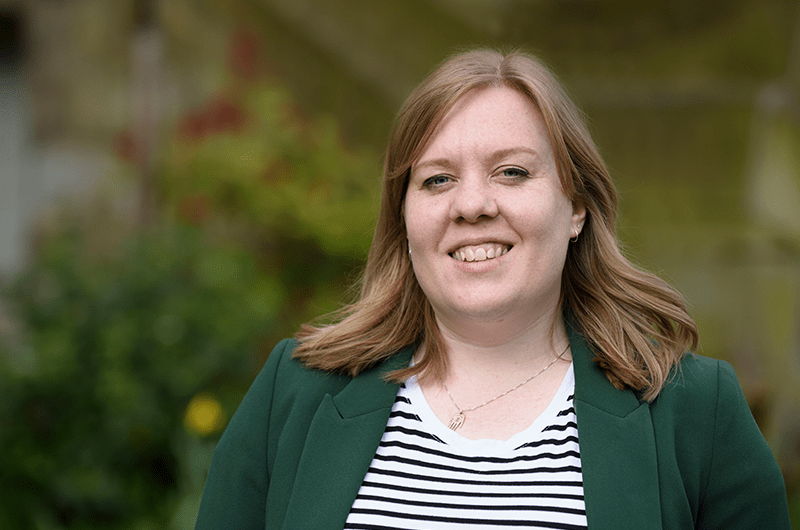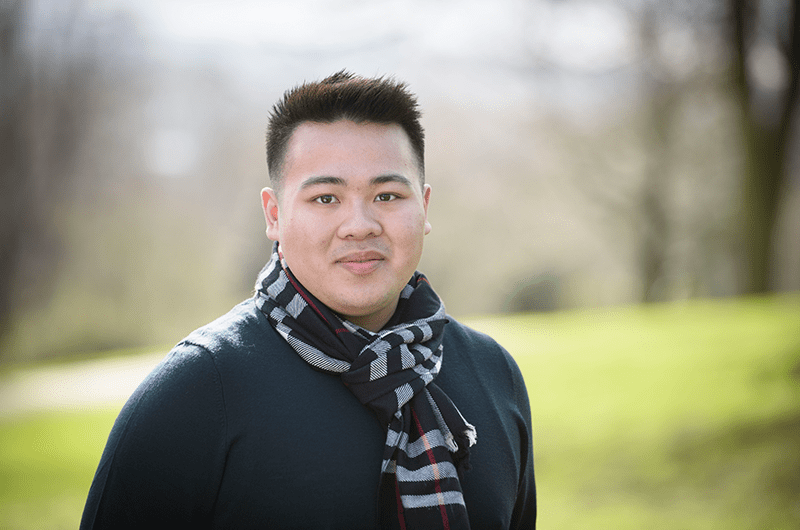Laura Frude (BA 2009, MPhil 2010, MPhil 2019) describes her role as Futures Scholarship Coordinator at the University of Bristol and the incredible impact it has on students.
The Futures Scholarship programme provides funding for students from a widening participation background and includes £2,000 in the students’ first year to use at their discretion and £2,500 they can access over the course of their degree to support employability. It supports those who may not start university on a level playing field with their peers or have the contacts to support them to build a career, and many of the students are the first in their family to go to university.
For some of my students, the Scholarship meant they could ease into their first term. Some have joined societies they wouldn’t otherwise have been able to join and others have bought essential equipment to support their studies, like a laptop or books. The employability element of the Scholarship is vitally important: it enables social mobility and allows students to assess career- enhancing opportunities based on what they will benefit from, not what they can afford.
We had 60 Futures Scholars in the first cohort in 2019, with students studying in all Faculties. I’m their dedicated support person, so I help them with applications and I have regular drop-in hours. This bespoke support is a really unique part of the Futures Scholarship programme at Bristol.
I’ve seen first-hand the difference it makes when students have supportive staff around them that encourage them and want them to succeed and develop.
Many of the students talk to me about imposter syndrome – they’ve achieved good grades but they don’t feel as ‘polished’ as some of their peers. Applying for jobs is a skill. It requires a certain level of confidence and many of the Scholars don’t have role models in the careers they want to move into. The University career fairs open an hour earlier for Futures Scholars and other widening participation students. This extra time means they can arrive early and don’t need to compare themselves to other people on their course. The Careers Service and I are also on hand during this extra hour for additional support.
We’ve also organised social events and strong bonds have formed between the students. They encourage each other and rally around when someone is applying for a job or opportunity. Since the COVID-19 outbreak, some of the students’ placements have been cancelled so I’ve been supporting them to explore online opportunities. It’s been a strange year for these students to start university but they are an extremely strong and resilient group of people.
I applied for the role as Futures Coordinator because I was that student. I came to Bristol in 2006 on a scholarship. My twin sister and I were the first people in our family to go to university and the bursary was transformative. I wanted to use my experience in pastoral and mental health care, and my experience of being a student from a widening participation background. I can honestly say it’s the nicest job I’ve had and I feel very privileged to be able to support others who are in the same situation I was in.
Some of our existing Futures Scholars might act as mentors to the next cohort, to provide some welcome support. The current students know they’ve received a really great opportunity and they want to give that back to other students and the University, in the way that many of our alumni and friends support these students.
Matthew Chang, a student of Economics and Maths, shares his experience of receiving a Futures Scholarship.
I’ve always done well academically. During secondary school I was put into an ‘able and talented’ class where we would do things like further Maths in small groups. Although my parents saw my potential, they aren’t university educated, so they couldn’t help me with homework. My mum did maths to GCSE level but that’s the extent of it, so I relied on my peers or my teachers to support me.
Before university, I knew I needed to put myself in the most ideal situation to support myself through it, so I worked at my uncle’s takeaway. But I knew I had to balance that work with studying to make sure I got the grades I needed, so I had to try and manage it the best I could. Even if it was only £30 or £40 a week, at least I had something to fall back on.
If your family can’t support you financially, and you’re working for 20 hours a week alongside university, that takes a mental toll. I think it would be really difficult to do well here at Bristol and hold down a job, so when I found out I had a scholarship I was absolutely ecstatic. The funding also meant I could buy a laptop – I wouldn’t have been able to afford one otherwise. It’s been really helpful for Maths because we did a fair amount of R coding in first year, which requires a computer. For Economics I have been able to write essays when I have a burst of inspiration or a new perspective. Having a laptop means I can just go anywhere and crack on with work, which has been a massive help to me. I’ve settled into Bristol much better than I thought I would.
When I found out I had a scholarship I was absolutely ecstatic.
Before the pandemic was declared, I had applied for some opportunities, including the University of Bristol’s International Leadership Programme in Madrid, where I received one of the 50 places available. I also applied to the Go China STEM programme, specialising in big data and analytics. Thanks to my parents, I already speak some Cantonese, but it would also have given me the chance to improve my Mandarin. Obviously, my plans had to change this year, but I’m optimistic that I can still pursue these opportunities at a later date.
If I hadn’t received the Futures Scholarship, I would be working a part-time job somewhere, feeling very excluded from everyone else, and I don’t think I would be doing as well as I am. I know a lot of people who have to work while they study and it can be really challenging. You don’t always have time to think of the bigger picture. My scholarship has changed my experience of university for the better, and for that I am extremely grateful.
The Futures Scholarship programme provides funding for students from a widening participation background and includes £2,000 in the students’ first year to use at their discretion and £2,500 they can access over the course of their degree to support employability.


